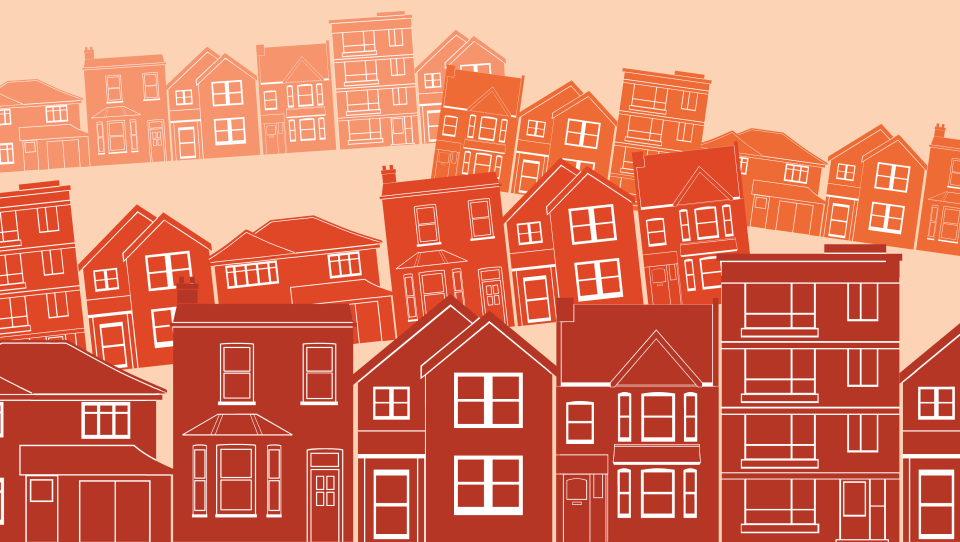If you get the feeling that housing costs are skyrocketing in Greater Boston, it is not your imagination. The median house price in Massachusetts jumped 41% between the post-financial crash low of 2009, when the median price was $331,417, to today, when it's $467,333.
But here’s what’s really surprising: The median house price in Greater Boston is even higher than the median home price in the New York metropolitan area, and has been since 2013.
It's not the first time real estate has been worth more here than in New York and the surrounding cities and towns there — that was true before the financial crisis. In 2005, New York's prices exceeded those in Greater Boston. In fact, house prices in Greater Boston began to cool off well before the 2008 financial crisis, peaking in 2005. While it took the Massachusetts market until 2016 to regain the losses of the financial crisis, New York area median home prices have never regained their 2008 peak of $434,000.
Compare Boston to over 400 other metropolitan areas by clicking the checkboxes to the left of the chart above.
Rising prices alone don't create a housing crisis, however. A housing crisis has to have at least two factors: rising housing costs and income that doesn't keep up with those costs.
In 11 of the years between 2000 and today, our housing costs exceeded those of residents of the cities and towns around New York. How many years did the median income exceed those in New York? Only one — 2018 — and by less than $1,000.
Just like the housing chart, click and compare other cities and regions to Boston by selecting from the checkboxes to the left of the chart.
The fact that housing costs have risen faster than income for residents of Greater Boston means that more of a resident's paycheck goes towards a mortgage payment or rent. But the story is more complicated — and interesting — than that. Gains in income over the past decade aren't distributed equally, and neither are rises in house prices. So does it matter where you live, when it comes to how much you'll have to pay as a percentage of your income? Absolutely.
Read more: The Big Squeeze: Why Does It Cost So Much To Live In Massachusetts?
We calculated what the monthly mortgage payment would be on a median-priced house in each town on the map above, using a 30 year mortgage with a 3.5% interest rate. We then compared it to the median income in that town. What percentage of their income would a median-income resident have to pay for a median-priced house in that town?
The range in Greater Boston is very broad — from Ashby, where a median-income resident would be able to afford a monthly mortgage payment of only 17% of the median income.
In Cambridge, on the other hand, high housing costs combined with incomes that aren't keeping up with them mean that a person earning the median Cambridge salary would be forking over 86% of their income to afford a mortgage payment on a median-priced house. In places where the median house price is out of reach for those with median incomes, more residents rent.
But renting in Greater Boston isn't easy, either.
The median rent in Boston is $1,445 per month, and while that may sound cheap, it includes the smallest possible studios and rooming house situations. In the Greater Boston area, places like Dover, Brookline, Lynnfield, and Hingham all have high median rents. In the chart above, the darker the municipality is, the more expensive the median rent. The most expensive median rents are clearly in a ring around Boston, in cities where people live and work in the state's tech corridor, or have Commuter Rail access to the city so they can work downtown.
As the squeeze intensifies, affordable housing programs aren't keeping pace with demand. And "affordable housing" can mean many different things, as WGBH News reporter Edgar B. Herwick reported in his piece on the many different meanings of the term. In Boston, for example, the city lists over 54,000 "income restricted" housing units, which range from public housing to deed-restricted condos for which buyers must meet certain income requirements.
But demand for affordable housing far exceeds supply, and hundreds of people often show up for housing lotteries where only a handful will be the lucky winners of something we all want: an affordable place to live.
Lisa Williams is the audience engagement editor at WGBH News. Kenya Hunter is an intern with WGBH News. Data sources: U.S. Department of Housing and Urban Development; City of Boston; AP/Case Shiller; MassGIS/Massachusetts Bureau of Geographic Information.




